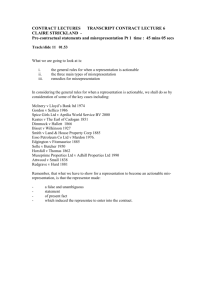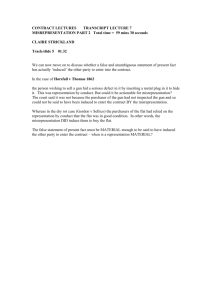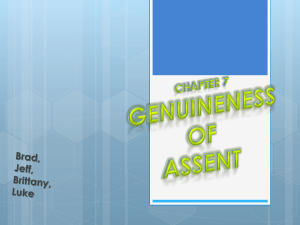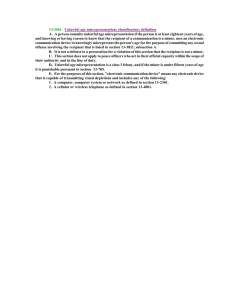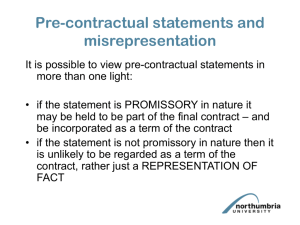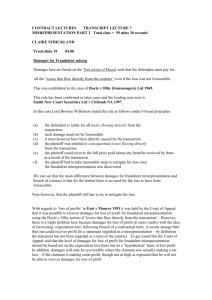LW212 MS May 15
advertisement
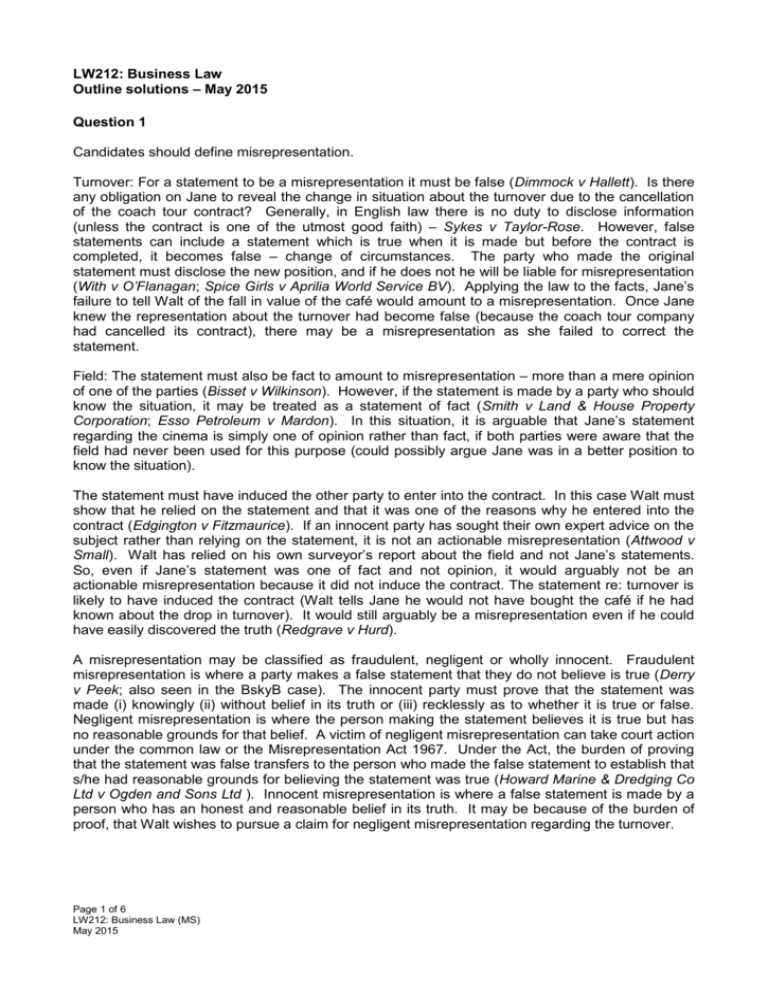
LW212: Business Law Outline solutions – May 2015 Question 1 Candidates should define misrepresentation. Turnover: For a statement to be a misrepresentation it must be false (Dimmock v Hallett). Is there any obligation on Jane to reveal the change in situation about the turnover due to the cancellation of the coach tour contract? Generally, in English law there is no duty to disclose information (unless the contract is one of the utmost good faith) – Sykes v Taylor-Rose. However, false statements can include a statement which is true when it is made but before the contract is completed, it becomes false – change of circumstances. The party who made the original statement must disclose the new position, and if he does not he will be liable for misrepresentation (With v O’Flanagan; Spice Girls v Aprilia World Service BV). Applying the law to the facts, Jane’s failure to tell Walt of the fall in value of the café would amount to a misrepresentation. Once Jane knew the representation about the turnover had become false (because the coach tour company had cancelled its contract), there may be a misrepresentation as she failed to correct the statement. Field: The statement must also be fact to amount to misrepresentation – more than a mere opinion of one of the parties (Bisset v Wilkinson). However, if the statement is made by a party who should know the situation, it may be treated as a statement of fact (Smith v Land & House Property Corporation; Esso Petroleum v Mardon). In this situation, it is arguable that Jane’s statement regarding the cinema is simply one of opinion rather than fact, if both parties were aware that the field had never been used for this purpose (could possibly argue Jane was in a better position to know the situation). The statement must have induced the other party to enter into the contract. In this case Walt must show that he relied on the statement and that it was one of the reasons why he entered into the contract (Edgington v Fitzmaurice). If an innocent party has sought their own expert advice on the subject rather than relying on the statement, it is not an actionable misrepresentation (Attwood v Small). Walt has relied on his own surveyor’s report about the field and not Jane’s statements. So, even if Jane’s statement was one of fact and not opinion, it would arguably not be an actionable misrepresentation because it did not induce the contract. The statement re: turnover is likely to have induced the contract (Walt tells Jane he would not have bought the café if he had known about the drop in turnover). It would still arguably be a misrepresentation even if he could have easily discovered the truth (Redgrave v Hurd). A misrepresentation may be classified as fraudulent, negligent or wholly innocent. Fraudulent misrepresentation is where a party makes a false statement that they do not believe is true (Derry v Peek; also seen in the BskyB case). The innocent party must prove that the statement was made (i) knowingly (ii) without belief in its truth or (iii) recklessly as to whether it is true or false. Negligent misrepresentation is where the person making the statement believes it is true but has no reasonable grounds for that belief. A victim of negligent misrepresentation can take court action under the common law or the Misrepresentation Act 1967. Under the Act, the burden of proving that the statement was false transfers to the person who made the false statement to establish that s/he had reasonable grounds for believing the statement was true (Howard Marine & Dredging Co Ltd v Ogden and Sons Ltd ). Innocent misrepresentation is where a false statement is made by a person who has an honest and reasonable belief in its truth. It may be because of the burden of proof, that Walt wishes to pursue a claim for negligent misrepresentation regarding the turnover. Page 1 of 6 LW212: Business Law (MS) May 2015 The two possible remedies for misrepresentation are rescission and damages. Rescission sets the contract aside, and puts the parties back into the same position they would have been in if the contract had never been entered into. Damages are a financial payment made to compensate the innocent party. Damages for fraudulent misrepresentation entitles the innocent party for all losses he has suffered (Smith New Court Securities v Scrimgeour Vickers). Where there has been a negligent misrepresentation under the provisions of the Misrepresentation Act 1967, damages are assessed in the same way as damages for fraudulent (Royscot Trust Ltd v Rogerson). Question 2 a) Candidates should define restraint of trade clauses e.g. these restraint of trade clauses seek to restrict Declan’s future freedom to carry on his business, trade/professional. Such clauses are prima facie void because it is not in the public interest to restrict competition. However the clause might be valid if reasonable considering, whether the business interest is one which can be legally protected such as trade secrets; the length of time the restraint lasts; the width of the geographical area that the restraint covers. Consideration should be given to whether the clause is reasonable. Business interest being protected – consider relevant case law such as Forster & Sons Ltd v Suggett (where the restraint was reasonable to protect a secret manufacturing process); Morris Ltd v Saxelby (where the restraint was not reasonable as it attempted to restrict the employee from using his own skills); Home Counties Dairies v Skilton (where the clause was excessive as regards selling of any dairy product, but valid in relation to working as a milkman); Proactive Sports Management Ltd v Rooney (P failed to show that the restrictions were reasonable). It seems that part (i) may be reasonable in terms of the business interest being protected (although it might be that the clause should not refer to production and sale, only manufacture), but (ii) is excessive in regards selling of any sports products (as Football Experts Ltd did not sell other sports products therefore it cannot seek to restrict Declan selling in the future). Length of time: 2 years may be fine. Location – UK may be fine, but Asia excessive. If a restraint is too wide, the whole clause is usually void. However, severance may be possible, allowing the rest of the clause to continue (Goldsoll v Goldman). It may be possible to sever “production or sale” and “any sports products” and “Asia”. Contracts can be illegal under the common law because the parties agree to do something which is against the law, or for public policy reasons. Examples include contracts to commit a crime or a tort (Evert v Williams); contracts damaging the country’s safety and in this case contracts to promote corruption in public life (Parkinson v College Ambulance Ltd and Harrison (1925)). Declan would not be able to recover the money. b) Definition of frustration. Situations leading to frustration include destruction of the subject matter (Taylor v Caldwell); personal incapacity of one of the parties (Condor v Barron Knights); Non-occurrence of event central to the purpose of a contract (Krell v Henry; Herne Bay Steam Boat Co v Hutton); subsequent illegality (Fibrosa Spolka; Gamerco SA); government intervention (Re Shipton). Candidates should identify when a contract is not frustrated – merely more difficult or expensive (Tsakiroglou v Noblee Thorl GmbH (1962)). c) Specific performance – equitable remedy not granted where damages are adequate; court cannot supervise the performance of the contract; not available for contracts of employment. Page 2 of 6 LW212: Business Law (MS) May 2015 Question 3 a) Duties of an Agent include performance – agent who agrees to act for P for reward must act according this instructions; skill – paid agent must maintain the standard of skill and care to be expected of a person in his profession; duty to account; no conflict of interest (Armstrong v Jones (1917)); not to make a secret profit (Boardman v Phipps (1967)); not to take a bribe (Boston Deep Sea Fishing and Ice Co Ltd v Ansell (1888)) and confidentiality. Holly may of breached the duty not to make a secret profit. b) Sale by description – Jenny relied on the description on the price tag that the coat’s filling was a 100% duck feather. A ‘sale by description’ is a sale where there is reliance on a description. Under s.13 of SOGA 1979, there is an implied term in every sale of goods contract that the goods will correspond to the description. This also covers goods which have been examined or selected by the buyer but the buyer relied on a description given of the goods. Description may be given on a label and the seller will be liable even if the label was put there by the manufacturer. Here, the coat was described as having 100% duck feather filling while in fact it only had 50% duck feather. HT Maxx has breached SOGA s.13 and this constitutes a breach of a condition, which gives Jenny the right to repudiate the contract and claim damages. Additional remedies are available under SOGA ss. 48A-48F for consumers. Under s.48B the buyer has the right to require the seller to repair or replace the goods within a reasonable time (usually 6 months). If the buyer cannot claim repair or replacement, or the seller fails to repair or replace the product within a reasonable time, the buyer can rescind the contract, or get a reduction in the price. Satisfactory Quality – s.14(2) of the SOGA implies into every sale made in the course of a business that the goods are of satisfactory quality. The law imposes strict liability on the seller. As HT Maxx is a business, it must comply with s.14(2). The stain and the damage on the lining of the coat indicate that the coat was not of satisfactory quality. The satisfactory quality of a product will be assessed by reference to a reasonable buyer. S.14(2)(a) states that the goods must meet the standard that a reasonable person would consider satisfactory, taking into consideration all relevant circumstances including price, age and description of the goods. The answer can be supported by reference to Clegg v Anderson (2003), Kingsway Hall Hotel Ltd v Red Sky IT (Hounslow) Ltd (2010) and Ward v MGM Marine Ltd (2012). Under s.14(2)(c) if the defects are brought to the attention of the buyer before the contract was made or if the buyer examined the goods (though there is no obligation to examine), the implied term does not apply. The remedies available are same as above. Page 3 of 6 LW212: Business Law (MS) May 2015 Question 4 a) ACF have acted carelessly but they don’t automatically owe a duty of care to James, Michael and Keith. The question is - have the requirements of Hedley Byrne v Heller and Caparo Industries v Dickman, amongst others been satisfied? There must be a “special relationship” between the parties, such that the claimant relied on the information and that the defendant knew of the reliance in order to engage in a specific transaction and it was reasonable to rely on the information provided. James – He may have relied on the information but ACF were unaware of his reliance, of the transaction he had in mind as a consequence of the information received. No duty owed. Michael – Same problem occurs here plus he received the information in a social situation making it even less likely he could claim (Howard Marine v Ogden, dicta in Hedley Byrne v Heller). No duty owed. Keith – He has the strongest case as he engaged in conversation with ACF. Therefore a proximate relationship may have come about if he made it clear he wanted to invest after reading the information from ACF. Candidates need to engage with the facts to ascertain this. Duty of care owed, breach established, therefore remedy of damages likely. b) David, a customer, is a visitor for purposes of occupiers’ liability as he is on the premises with permission. Under the Occupiers’ Liability Act 1957 – a common duty of care is owed to David. The occupier (Kevin) must take such care as is reasonable, in all the circumstances of the case, to see that the visitor will be reasonably safe in using the premises for the purpose for which invited by occupier to be there. As duty is to ensure that David is reasonably safe whilst waiting for his pizza – likely there is a breach of duty. Pizza mix should have been cleared up immediately it was spilt (Ward v Tesco Stores). David can claim for personal injury under OLA 1957, the broken ankle, & any property (the cost of the designer jeans) which has been damaged in the fall. Maureen is a visitor. As above, OLA 1957 will apply and a common duty of care applies. Relevant premises include all the area of the restaurant except places where she is implicitly or explicitly banned from entering. She wandered off into the area of the toilets – still a lawful visitor. OLA 1957 s.2(3)(a) states that occupier must expect children to be less careful than adults. A higher standard of care is owed to the child visitor. Although adults may know berries may be poisonous a child will probably not. (Taylor v Glasgow Corporation). Kevin may argue that it is expected that Mary would have been supervised by her parents (Phipps v Rochester Corporation). But this argument only applies where the child is either very young or it is a place where it is expected that children will be supervised because of specific hidden dangers of the premises. Neither apply here (Jolley v Sutton LBC) Page 4 of 6 LW212: Business Law (MS) May 2015 Josh is initially a visitor but once he enters a room clearly off limits he does not have permission and therefore is a trespasser. Occupiers’ Liability Act 1984 applies. Duty of care under OLA 1984 is not automatic and by s.1(3) a duty will be owed by an occupier to a trespasser if: i. ii. iii. The occupier was aware of the danger on the premises or had reasonable grounds to believe it existed (Kevin may be aware of the rotten floorboards in the room marked “Private, no Entry”); and The occupier knew or had reasonable grounds to believe that the trespasser was in the vicinity of the danger (very unlikely here, as Josh was clearly acting in secret); and The risk was one against which, in all the circumstances of the case, the occupier could reasonably be expected to offer the trespasser some protection (here unlikely, as the room was clearly marked “No Entry”. No duty of care owed. Question 5 a) Jacques – The written statement is not the contract per se. It is the employer’s evidence of what has been agreed (System Floors v Daniel). Therefore John can bring contrary evidence in play to demonstrate that he is entitled to the bonus payment (British Gas v Robertson). The question is – what has been agreed? Jacques will argue that the contractual agreement was made on appointment and the statutory statement was an attempt to vary the contractual terms on this issue. But for a variation to be valid you need to demonstrate consent. Jacques has not consented. The work he is doing (even as a part time role in his own time) is in breach of the implied term not to compete with your employer (Hivac Ltd v Park Royal). The copying out of lists and handing them over to his potential new employer is breach of the implied term not to disclose confidential information (Faccenda Chicken v Fowler; Bullivant v Ellis). This would justify dismissal at common law. Ralph’s refusal to re-train on a new computer system will be in breach of the implied term to ‘obey reasonable orders’ (Creswell v Inland Revenue). b) Wrongful dismissal – dismissal in breach of contract, such as where the employee has been dismissed with inadequate or no notice. Remedy is an action for damages in the civil courts – the amount of wages that should have been paid during the notice period. This is because the objective of damages is to put the aggrieved party into the position as if the contract had been performed lawfully. As the contract could have been terminated lawfully by notice the amount of damages is limited. Unfair dismissal – dismissal in breach of statute (s.98 ERA 1996). Employer must show employee was dismissed for one of five reasons (conduct, incapability, to continue to employ the employee would be illegal, redundancy or some other reason connected to the employment relationship) and that the decision to dismiss was reasonable taking into account the merits of the case. The ‘merits’ test requires the tribunal to ask – was the decision of the employer to dismiss a reasonable response of the reasonable employer in all these circumstances (Iceland Frozen Foods v Jones). The severity of, for example, the misconduct or incompetence will be a relevant factor, including the record of the employee. Procedural requirements must also be considered. Did the employer investigate the alleged misconduct or incompetence? Have warnings been given where this had happened before? Was the employee given the opportunity to respond to the allegations and the right to appeal? (Burchell v BHS; ACAS code). Page 5 of 6 LW212: Business Law (MS) May 2015 Question 6 Formalities – candidates should state definition of partnership, note little formal process required, but normally a partnership agreement will be drafted. If no partnership agreement the provisions of the Partnership Act 1890 will govern the responsibilities between partners. For a company – candidates should list and explain the registration requirements necessary. An explanation of the relevant documents and their significance; particularly the Articles of association. Liability - in a general partnership – no legal identity of its own. The risks and liabilities involved in running the business belong to the individuals involved in owning and managing it. In a company separate legal personality. Candidates should explain the operation of this concept and essence of limited liability. Responsibilities of partners/directors – Candidates should note that apart from personal liability for all the debts of the business partners also have responsibilities to each other e.g. s.9/10 Partnership Act 1890 on joint and several liability, s.5 on agency/express/apparent authority, duty to account (s.29) not to compete with partnership (s.30) etc. Directors are controlled through the numerous directors’ duties enshrined in the Companies Act 2006. Candidates should examine some of these duties and associated case law – for example, duty to act within powers (s.171); duty to promote success of the company (s.172); to exercise independent judgment (s.173); to exercise reasonable care and skill (s.174); to avoid a conflict of interest (s.175) etc. Page 6 of 6 LW212: Business Law (MS) May 2015
